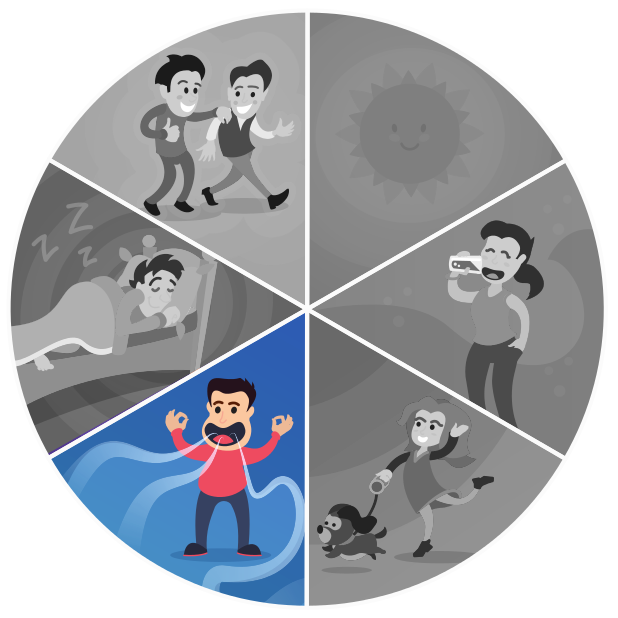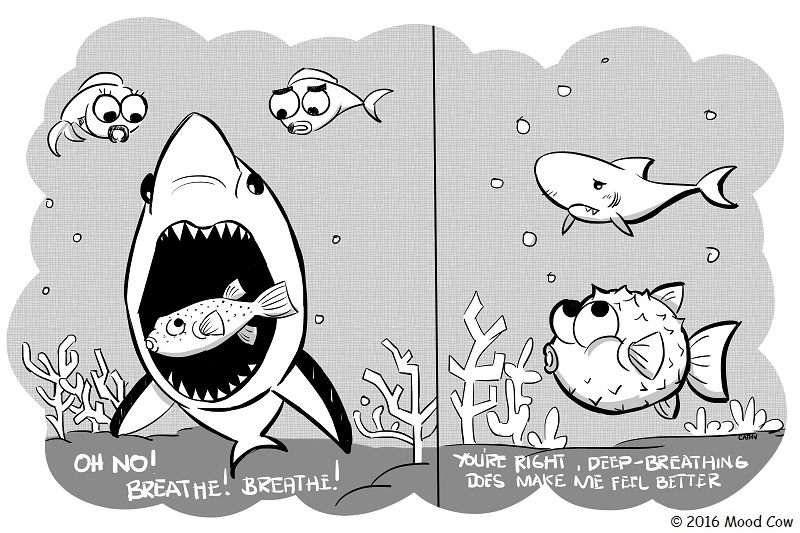Home > Mental care actions > #4 Breathing
#4 Breathing
Deep abdominal breathing reduces stress.

Scientific evidence
People typically breathe 12 to 20 times a minute at rest. When stressed, people experience fast heart rate and shallow breathing. The diaphragm's range of motion is limited with shallow breathing, resulting in less than fully oxygenated air. Slow, deep breathing encourages full oxygen exchange, improving the chemical balance of the body.
Deep breathing also activates the nerve system and improves the balance between sympathetic and parasympathetic nervous systems, driving heart rate down and lowering blood pressure. Deep breathing has been utilized as a major component of relaxation techniques for stress management, such as yoga and meditation for years.
[1] Cabral P, Meyer HB, Ames D. Effectiveness of Yoga Therapy as a Complementary Treatment for Major Psychiatric Disorders: A Meta-Analysis. The Primary Care Companion to CNS Disorders. 2011;13(4). Link
[2] Chiesa A., Serretti A. Mindfulness-Based Stress Reduction for Stress Management in Healthy People: A Review and Meta-Analysis. The Journal of Alternative and Complementary Medicine. May 2009;15(5): 593-600. Link
[3] Grossman P., Niemann L., Schmidt S., Walach H. Mindfulness-based stress reduction and health benefits: A meta-analysis. Journal of Psychosomatic Research 2004;57: 35–43. Link
[4] Spijkerman, MPJ., Pots, WTM., Bohlmeijer, ET. Effectiveness of online mindfulness-based interventions in improving mental health: A review and meta-analysis of randomised controlled trials. Clinical Psychology Review. 2016. Link
What you can do with this knowledge
- Exhale for 6 seconds, inhale for 6 seconds, and repeat 5 times. Do this whenever you feel a little stressed. It only takes a minute.
- When you get comfortable with this slow, deep breathing, try to let the air flow down toward your belly button. If done properly, you'll feel your abdomen bulging out instead of your chest puffing up.
Caution
Don't be stressed trying to master proper breathing techniques. Just slow down your breathing and inhale and exhale as deep as you can.
Good reads
- This article is well-grounded in current science and offers a broad view of relaxation techniques.
- Very good read. Similar to the NIH article but more up to date and comprehensive. Highly recommended for relaxation techniques.
- A practical guide to deep breathing.
- Relaxation techniques: Breath control helps quell errant stress response by Harvard Medical School: 2015. Link
- For further exploration, use the search keywords: deep breathing stress
- Relaxation Techniques for Health by National Center for Complementary and Integrative Health, NIH: 2014. Link
- 15 Relaxation Techniques To Reduce Stress by RelaxLikeABoss.com: 2018. Link

